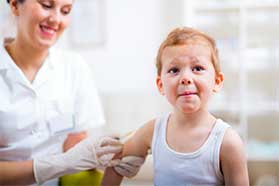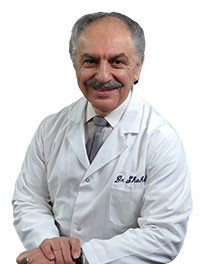Rubella Treatment in Midland Park, NJ

Not to be confused with Rubeola (measles) , Rubella, also known as German measles and sometimes three-day measles, is a contagious viral infection characterized by a distinctive red rash. While separate from measles, the two are often mistakenly conflated because of their similarity in symptoms, particularly a red rash. However, rubella is caused by a different virus (the rubella virus) and is not as infectious, nor as severe, as measles.
Less than 10 people are reported to have rubella each year in the United States, making the infection rare; however, rubella was once common and widespread (affecting as many as 12.5 million people during the last rubella epidemic) in the U.S. prior to the advent of the measles-mumps-rubella (MMR) vaccine in 1969, which has since virtually eliminated the virus's presence in America. The virus remains in other parts of the world where vaccines aren't readily available.
While a relatively mild infection, it is important to have your children vaccinated twice before they reach school age to ensure they are protected from the virus; women who plan to get pregnant especially should discuss vaccination with their healthcare provider as a rubella infection poses a risk of birth defects. To schedule a consultation with a qualified healthcare provider in Midland Park that specializes in rubella treatment, call (201) 806-6099 or contact Dr. M.T. Shahab online.
Rubella Causes
Rubella is easily spread via person-to-person contact, such as when you are caught in the crossfire of an infected person's coughs or sneezes, or when you become directly in contact with the infected person's respiratory secretions (such as their mucus). Once infected, a person is contagious for an average of 10 days before the onset of the illness' distinctive rash, and for one to two weeks after the rash disappears. However, a person can spread rubella before its symptoms present. While rare in the United States, cases do occur and, because rubella causes uncomfortable symptoms, seeking your healthcare provider's advice regarding treatment is key to manage your symptoms and help prevent the spread of rubella.
Rubella Symptoms
Unlike rubeola, rubella symptoms are often mild, often so mild as to make it easy for them to go unnoticed, especially in children. When symptoms do present, the most distinctive of symptoms includes a red rash on the face which may spread to the body. Other symptoms may include:
- Mild fever of 102°F (38.9°C) or lower
- Headache
- Stuffy or runny nose
- Inflamed, red eyes (pink eye)
- Enlarged, swollen lymph nodes
- Sore throat
- Aching joints, especially in young women
- Cough
- General discomfort
Rubella in adults is usually indicated by mild illness, accompanied with a low-grade fever, a sore throat and a rash that starts on the face and spreads to the body. Some adults may also experience a headache, pink eye and general discomfort prior to the appearance of the rubella rash. Contrastingly, 25-50% of people infected with rubella will not experience any symptoms.
Rubella Treatment
If you or your child do contract rubella, your healthcare provider will likely recommend to isolate yourself from others for the duration of the infectious period. Since symptoms of rubella are often mild, additional treatment is rarely necessary. Your healthcare provider will likely recommend for you to get plenty of rest as necessary and to take acetaminophen (Tylenol) to relieve discomfort from fever and aches.
Prevention is often the best rubella treatment to ensure any uncomfortable symptoms associated with rubella don't occur.
Rubella Vaccine
The measles-mumps-rubella (MMR) vaccine remains the best form of rubella prevention. The Centers for Disease Control and Prevention (CDC) recommends that all children receive two doses of MMR vaccine, starting with the first dose at 12 through 15 months of age, and a second dose at 4 through 6 years of age. Children can receive the second dose earlier, so long as it is at least 28 days after the first dose.
Adults who do not show evidence of immunity should get at least one dose of MMR vaccine. If you plan to become pregnant and have not yet received the MMR vaccine, vaccination is often recommended, as rubella poses a threat to your developing baby. Without vaccination, potential complications of your pregnancy may include miscarriage or death after birth, as well as birth defects including heart problems, loss of hearing and eyesight, intellectual disability and liver or spleen damage. You should avoid becoming pregnant until one month after receiving the MMR vaccine. Ideally, you should postpone pregnancy until after receiving a blood test to confirm your immunity.
Schedule a consultation with a qualified healthcare provider in Midland Park that specializes in rubella treatment and prevention. Call (201) 806-6099 or contact Dr. M.T. Shahab online.
Medwell Orthopedics & Functional Medicine for Men & Women
Address
33 Central AveMidland Park, NJ 07432
(201) 806-6099
www.BergenCountyDoctors.com
Hours
Mon:
8:00 am - 8:00 pm
Tue:
2:00 pm - 7:00 pm
Wed:
8:00 am - 6:30 pm
Thu:
8:00 am - 1:00 pm
Fri:
8:00 am - 6:30 pm
Sat:
9:00 am - 1:00 pm
Sun:
By Appointment Only


